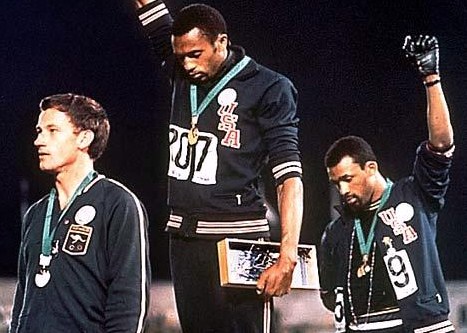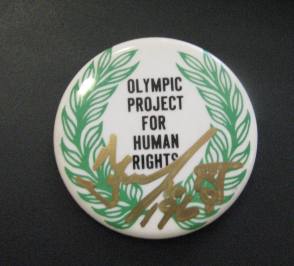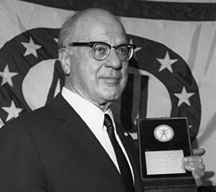
200-meter silver medalist Peter Norman (left) stands with gold medalist Tommie Smith (middle) and bronze medalist John Carlos (right).
At the ‘68 Summer Olympics, Tommie Smith, John Carlos and Peter Norman defined the games with an iconic image of the civil rights movement. Two athletes stood on the podium with their heads down, arms in the air and fists clinched. The third athlete stood in silent solidarity. The trio’s courage and boldness was a defining symbolic declaration that called attention to a social ill.
Awaiting the victory ceremony after winning the 200-meter race, the three gathered before walking out to receive their medals. The trio were members of the Olympic Project for Human Rights, a collection of athletes dedicated to using the Olympics as a platform to call out racial injustices in the United States to the world.
Symbolizing unequal economic and social opportunities in the United States, Smith and Carlos both donned a black glove and walked to the podium in black socks. Carlos unzipped his track suite symbolizing the blue collar workers and wore a beaded necklet protesting the lynchings that took place in history. While it appeared Norman did not participate, his silence was instrumental. Norman—an Australian— showed his support by pinning his Olympic Projects for Human Rights badge to his jacket alongside his competitors.
When the “Star Spangled Banner” started, Smith and Carlos threw their fists in the air, a gesture referred to as the “Human Rights Salute” (sometimes referred to as the “Black Power Salute”). After the anthem finished, all three—Norman included—felt the consequence of the defiant, yet just act. The Mexico City arena filled with boos from the audience, who also shouted out curse words and racially charged remarks.
On the basis of stating an unnecessary political statement, the International Olympic Committee President Avery Brundage expelled Smith and Carlos from the games and the Olympic Village. Brundage felt the pair were violating one of the tenets of the “Olympic Spirit” by mixing sports and politics. The U.S. Olympic Committee initially refused Brundage’s request, but had to give in as Brundage threatened to suspend the whole U.S. track team if they did not follow suit. It was not until a couple days following the 200-meter ceremony that Australian Olympic officials saw Norman’s connection to the protest.
Upon returning home, the three athletes all received threats on their lives and dealt with the economic, career and social impact of a protestor. Time Magazine called the act “a public display of petulance.” They went so far as to make a pun of the Olympic motto, calling the Mexico City games, “Angrier, Nastier, Uglier”—instead of “Faster, Higher, Stronger.” Smith was immediately fired from his job at the Pontiac dealership. Norman’s running career slowed down as he was not invited to the following Olympic Games in Munich, and was not invited by the Australian Track team to run in a VIP lap at the Sydney Olympics in 2000.
Carlos’ personal life suffered as he slipped into depression when job prospects faltered. At one point when he was unable to pay the heating bill, Carlos had to chop up furniture to keep his house warm. Four years after they split up, Carlos’ first wife Kim took her own life in 1977. Even though many horrible things ensued after the ’68 Olympics, Carlos never regretted his action, and thus accepted the turmoil that followed. In an NPR interview, Carlos was adamant that the move was needed: “As much as I love my wife, she’d have to take her life again, and again, and again. Because I cannot sacrifice society for one individual’s life — mine nor hers.”
In the years to follow, the backlash from their symbolic gesture only slightly regained dignity in the eyes of the public. After graduating from San Jose State University, where he continued to break world records, Smith was a wide-receiver for the Cincinnati Bengals and taught in several universities. Returning to the Olympics, Carlos aided the committee who brought the games to LA. Carlos now works at Palm Springs High School, where he’s a guidance counselor and the school’s track and field coach. Norman continued to run until a 1985 injury. When Norman passed away in 2006 from a heart attack, Carlos and Smith were pallbearers at his funeral. Apologies for his treatment at home never came until earlier this week, when an Australian Member of Parliament praised the “heroism and humility” of Norman.
While these Olympians will be remembered, they’ll most likely not be remembered for the race they won— even as Smith broke his own world record. They’ll be remembered for challenging people’s comfort. Like Gandhi and Martin Luther King, they broke a rule to prove a point. Their boldness was paid with the price of impended backlash. In a speaking engagement Carlos made last month during his book tour, when a student asked why he took the risk, Carlos replied, “Because it was so many individuals that were in positions of power that chose to just lay back.”
–Stew


Think people should hear about this?